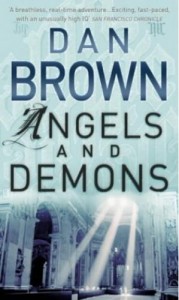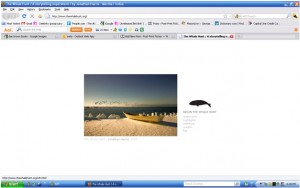
If you look at the two images above you will notice one key difference – the size of the name of the author. As we had talked about in class, society is consumed with the idea of the “author” and of discovering his or her past in order to capture the meaning of the work rather than letting the work speak for itself. These two images are two prime examples of how Jonathan Harris and Dan Brown differentiate as artists. Dan Brown feeds into the idea of the “author” as his name is written equally as large if not larger than the title of the book, while in Jonathan Harris’ work, Whale Hunt, his name is written in smaller letters so that the image (the work) can be highlighted instead.
In the Death of the Author, Barthes writes that many author’s including Mallarme, distanced themselves from the notion of the “author” because like for him and assuming Harris, and
“For us too, it is language which speaks, not the author; to write is, through a prerequisite impersonality (not at all to be confused with the castrating objectivity of the realist novelist), to reach that point where only language acts, ‘performs’, and not ‘me’. (143)
Replacing written text with images, Harris allows for the images that he captured in Whale Hunt to ‘perform’ for themselves, rather than having himself be fully emerged in his work. It is through these images that we, as readers, are able to make sense of the whale hunt and of the situations, and living conditions that Harris and his team had to endure. We don’t need for Harris to walk us through the journey of the whale hunt – we are able to see it ourselves through these images. Similarly in We Feel Fine, Harris steps outside of the work and let’s several individual writers of different nations, ages, gender, emotions, and so on take shape of the work. The website combined with these anonymous authors and images speak for themselves. Because Harris detaches himself from these two works, we are able to appreciate them for what they are rather than for being the works of the famous Jonathan Harris.
As writer, Julia Alvarez, mentions, the reader should not try to create a personal relationship with the author, but “with where the author has disappeared in the work.” The beauty about the distance that Harris establishes between himself and his works is that in doing so he gives us multiple options of how we want to view his works. There is no one set way of how to interpret the works and there is no one meaning to them. Barthes writes that “to give a text an Author is to impose a limit on that text, to furnish it with a final signified, to close the writing.” (147) In Whale Hunt, we can either view the images from beginning to end or vice versa, we can see them in a pinwheel, mosaic, or time line, or we can select a team member of the Whale Hunt and view his or her individual experience through their personal images. All the while, in We Feel Fine, we have the option of looking at what people write depending on their emotion, gender, geographical location, age, and so forth – the range of options are endless.
Based on my reading of The Death of the Author, I interpreted that a work is not so much based on the author as it is on the work. Barthes supports this argument by writing that “the reader is the space on which all the quotations that make up a writing are inscribed without any of them being lost; a text’s unity lies not in its origin but in its destination” (148). This is to say that it is the reader who unifies the work not the author. In his works, Harris gives readers the ultimate opportunity to put the pieces of his works together to create their own interpretations. Each person views these two works differently.
I agree with Barthes when he says that “the birth of a reader must be at the cost of the death of the author” (148) because as long as we continue to have the notion of the “author” we will continue to value proper names over works, and instead of trying to find meaning in the work through the text itself and appreciating the work for what it is, we will continue to try to have a relationship with the author in order to find meaning and understanding of his or her work.

I love how you incorporated the two pictures, because they really do emphasize how Dan Brown wants to get his name out there, while Harris focuses on his work. You quote from Barthes that authors limit their text. I’ve been thinking about that and the different constraints that Harris incorporates into the two sites (different people, the weather, gender, feelings…). Even though it gives the reader more options, I think it makes reader limit the text as well.
This is a really interesting idea—that the images “perform.” On one hand, the concept seems to ascribe too much intention to the work itself. On the other hand, the word “perform” suggests, obviously, a performance. And I wonder if we can think about Harris’s work as a kind of textual instrument (like a musical instrument), and each “reading” of it is actually a different playing of the instrument.